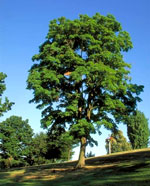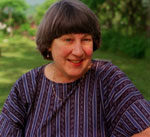Just now despair lives close to the surface in many people I know, and leaks out at surprising times. Taking a walk with my neighbor Phil, a bottle of milk in his arms, my daughter on my back, I’m thinking how warm the spring day feels when he stops suddenly and speaks.

Maple leaf sag.
“We had a friend over this morning, an expert in landscaping. I mentioned that we were thinking of planting a sugar maple tree. He told us that maybe we shouldn’t, because climate change could make it impossible for sugar maples to live in Vermont in a matter of decades.”
For a moment all we can do is stand together in the April sunshine and try to comprehend Vermont without sugar maples. None of that dappled welcoming shade on summer afternoons. Fewer splashes of red on the hills each October. Children who must go to the library to learn how maple syrup used to be made in their hometowns.
Reports on the problems plaguing ecosystems around the world keep streaming at us, even as people around the world kill and maim each other in the name of security, justice, or revenge. All the while our government systematically undermines the sort of international agreements — from the Kyoto Protocol on climate change to the anti-ballistic missile treaty — that could make the world a safer place.
Just now it is easy to listen to the voice of despair, the voice that says, “Anyone who thinks there’s a way out doesn’t understand the magnitude of the problem.”
Of course, despair does nothing to guarantee our children a world with sugar maples and safety. If we assume all is lost — if we stop working for change — we create a self-fulfilling prophecy. But it is one thing to recognize this fact and another to keep going day after day in the face of frightening trends and a reckless national leadership.

Donella Meadows.
I don’t think there is a magic cure for despair, but there are things I’ve learned from watching people who are able to carry on bravely working in the face of seemingly intractable problems. Especially I have learned from the woman who founded the institute where I work. Donella Meadows was a scientist and writer who spent 30 years analyzing and communicating about problems ranging from poverty to pollution without allowing despair to slow her stride. From watching her in action, I’ve created a short list I turn to when despair threatens.
In their deepest essence, people are good. We’ve created social and economic rules that make it hard for us to act out of this goodness, but what we have created we can change. We could tax pollution and consumption and reward land stewardship. We could invest in healthcare instead of weaponry. From the abolition of slavery to women getting the vote, our history shows us that dedicated people can change the rules under which they live. And Donella Meadow’s example convinced me that focusing on the rules of the dysfunctional system rather than the people trapped by those rules frees us from the preoccupation with blame and enemies that in the end only fuels despair.
Small changes can snowball. When and where this snowballing effect will happen is unpredictable. But if enough people take small stands and make small changes, a system can shift, suddenly and dramatically. It is because of this possibility that a trend is not a prediction. Each time you speak the truth or act out of love for something beyond yourself, you create the possibility of someone else doing the same. You create the possibility of an upward spiral.
It will be a great adventure. Imagine how you would live in a better world, and then try to live that way in this one. Not everything you do will take off into a snowball of change, but everything you do is an opportunity to live your life out of your deepest convictions. When she wasn’t writing or teaching, Donella Meadows rejoiced in the fertility of a vegetable garden or the satisfaction of insulating a farmhouse wall. She always lived out her global convictions in small, practical ways — in one community, on one piece of land. We live in uncertain times, but we can relish the beauty and resiliency all around us, and we can align our lives with both.
There is so much at stake. The trends are scary and they seem likely to get worse before they get better. There are going to be times, perhaps many of them, when we think, “I don’t make a difference, and it’s too late anyway.” But always, we have the option to reply in a voice that is just a little bit louder than that sly whisper — the voice that is saying, “People are good. Small changes can snowball. It will be a great adventure.”


